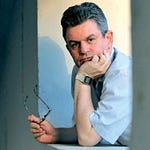Robert Stark speaks with James O’Meara about his book, Mysticism After Modernism: Crowley, Evola, Neville, Watts, Colin Wilson, & Other Populist Gurus. Mysticism After Modernism is published by Manticore Press, where it is available for purchase. You can also find it at Counter-Currents and on Amazon.
“Our spirituality has gotten too tame today. James J. O’Meara has a solution [in Mysticism After Modernism]
–Mitch Horowitz, PEN Award-winning author of Occult America and The Miracle Club
-The intersection of mysticism with politics and culture, and how mysticism is available to any political persuasion
-Countering the Hippie-dippy liberal stereotype about New Age gurus
-Critiquing the reactionary who passively accepts cycles of decay, and the need to embrace infinite possibilities
-A practical take on magic/mysticism, in regards to enacting real world change
-Aleister Crowley’s definition of magic as transforming the World in accordance with one’s will
-Examples of opinions and attributes of Alan Watts and William Burroughs that come across as anti-liberal
-Greg Johnson’s article, “The Spiritual Materialism of Alan Watts: A Review of Does It Matter?”
-Watts’ ties to quasi-fascist Serbian mystic, Dimitrije Mitrinović
–New Thought, and an explanation for how Neville Goddard’s Law of Assumption works
-New Thought as a vehicle for political change, by removing all mental constraints
-Why Theosophy is the theology best adapted to hereditarianism (eg. illiberal pluralism)
-William Burroughs’ obsession with rejecting control in a metaphysical sense
–The Greek Qabalah, hidden esoteric traditions in Abrahamic faiths
-Colin Wilson’s practical mysticism, focused on expanding consciousness
-Parapsychology and Spiritual Science
-The need for spiritual elitism and Aristocratic Radicalism
-Robert’s novel, Vaporfornia, which has themes relating to New Thought
-James’ book, Passing the Buck: Coleman Francis and Other Cinematic Metaphysicians












Share this post